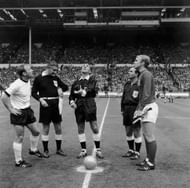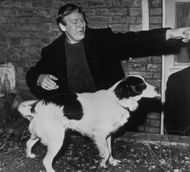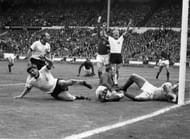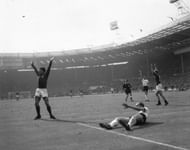The heat is now growing on our list, as we reach the second runners up on our list! The one to grab the last podium place is:
Geoff Hurst’s ‘Ghost-goal’, World Cup Finals, 1966.
The 1966 World Cup was yet another special one (is there ever a World Cup that is not?), for football was coming back to its home. The Brits were going to host it, and, truth be told, their performances in World Cups was a far cry from what was to be expected from the people who came up with the sport in the first place.
The World Cup already had had its fair share of drama, as the Jules Rimet Trophy was stolen from display, and was then found by an unlikely hero in disguise, Pickles, the dog, who later went on to inspire the conception of the first ever mascot for a World Cup.
The tournament was also the crowning glory for the Portuguese ‘Black Panther’ Eusebio, who scored an incredible 9 times in this edition of the tournament, with 4 of them coming in a single match versus North Korea, where Portugal had staged one of the greatest comebacks ever to come back from 3 goals behind to triumph 5-3.
The Background
The World Cup was one played tactfully, and most people had chosen to play carefully rather than hammering each other’s nets with whatever they could throw at them. England represented this ideology loud and clear, as they scored only 4 goals in the group stages, but didn’t concede even one. Following a goalless tie against Uruguay, they experienced back-to-back wins against France and Mexico to qualify for the knockouts. A set of narrow one-goal margin wins against Argentina and Portugal in the quarterfinals and semifinals respectively were enough to see the team without any wingers to the finals.
For West Germany, the tournament had already proved to be a disappointment even before it commenced. Batting for the honor to host the World Cup, they lost out to the Brits and missed out on home advantage. This initial sting refused to hamper their football however, as they proceeded to hammer minnows Switzerland, draw with Argentina and win against Spain to qualify for the next round. Their playing style was an antithesis of the careful Brits, as they flamboyantly clobbered Uruguay in the quarterfinals, and edged past the Soviet Union to book a top 2 spot for themselves.
The finals were to take place at Wembley, in the heart of the British empire, with a crowd loosely resembling a 100,000-person mob cheering their nations on. The Brits kicked the game off, and the two teams stayed evenly matched for some time, exchanging initial greetings and shots at the target. The Germans drew the first blood, as Ray Wilson cleared a ball straight to Helmut Haller, who in unforgiving manner gave his team a goal to its name.
The initial setback was far from discouraging for the Britishers, who brought the scores on to a level pegging in the form of a header by Geoff Hurst, who scored his first goal of the total three that night, a record in itself. The got their noses in front soon afterwards, as a corner in the 77th minute saw Martin Peters get his name on the scoreboard.
The Germans refused to back down, and right when all hope seemed lost for the Germans a minute from full time, Wolfang Weber took a bullet of a shot that rattled into goal to bring the two giants of world football back to square one. This goal, however, had become the first controversial one of the night, as the entire British team, including their goalkeeper, the legendary Gordon Banks, maintain that the ball struck Karl-Heinz Schnellinger on the hand before it very nearly tore the back of the net.
When it was clear that normal time was far from capable enough to separate these two behemoths, extra time came to the rescue, and then began what would indeed become one of the most memorable moments in World Cup football.
The Moment
England seemed to be unaffected of 90 minutes of FIFA 13′s equivalent of ‘Legendary’ difficulty football, and had already taken two cracks at a potential match and cup winner. Conversely, Germans became more and more sluggish progressively, as their Gatorade bottles dried up.
10 minutes into the extra time, Alan Ball whipped the ball in, and Geoff Hurst twisted and fired a shot straight at the post. The ball ricocheted off the post straight down, either on or just beyond the line (the rules state a goal can only be given if the ball crosses the line completely). 400 million people around the world, glued to their television sets, saw the fuming German team, a celebrating British one, and two referees madly gesturing towards each other due to the absence of a common language. Whether or not the information was lost in the ensuing 10 minutes of dumb charades, we know not, but the goal (whether or not it was one) stood. England now led Germany 3 goals to 2.
The Germans’ fury knew no bounds, and their indignation boiled onto their game. Their desperate attempts to somehow claw back into the game fell flat, as Geoff Hurst broke through yet again and smashed home, the forward immortalised in the dulcet tones of BBC Commentator Kenneth Wolstenholme, whose words on the situation were: “And here comes Hurst. He’s got… some people are on the pitch, they think it’s all over. It is now! It’s four!” And indeed, the episode for the night was over, and the drama for the following millennium began.
The Aftermath
The cup wasn’t to tour the Reichstag that year, it was to stay at the Windsor. Geoff Hurst became a national hero, and all the Britishers could hold their heads just a bit higher than usual for the following four years. They had every reason to believe that the goal was a fair one, and their own players on the pitch were oh so convinced that the shot had gone beyond the line and into history. Into history it did go, but it did fall short of the goalline, by a good 6 cm at that if the research by the Engineering division of the Oxford University is accurate enough.
Further evidence, videographic at that, taken by a amateur filmer by the sidelines, clearly indicates the ball NOT crossing the goal line.
The plot grew thicker as there were allegations against the Soviet linesman, Tofik Bakhramov, for being against the Germans after they knocked the match official’s national team out of the tournament in the semifinals. Some even went to the extent of fabricating an apocryphal tale about Bakhramov replying to the protesting Germans with a single word: “Stalingrad” (the infamous battleground that served as the epicenter of the carnage in the second World War).
The German players maintain that they saw chalk dust fly, the conclusion being that the ball landed ON the line, and not beyond, thus making the shot in vain.
The controversy carried on into the 21st Century, when the British team were playing a friendly match against the Azerbaijan national team. Azerbaijan happens to be Bakhramov’s home country, where he is considered a national hero, as both the national team and a stadium in Azerbaijan are named after him. A few visiting British fans even visited Bakhramov’s grave to lay flowers, thus spurring the rumourmongers on further.

Referee Gottfried Dienst, of Switzerland, tosses the coin before the start of the World Cup final at Wembley between England and West Germany. He is watched by German captain Uwe Seeler, (left), the Russian linesman Tofik Bakhramov (looking at watch) and English captain Bobby Moore (1941 – 1993) (right).
In the statements coming from the horse’s mouth (Bakhramov’s pen, in this case), he states that he saw the ball bounce off the net and not the post, thus eliminating the need to know whether or not the ball crossed the line.
The event had become a legend in itself, and it’s impact on popular culture was massive, with both KitKat and Adidas advertisements taking digs at what might have historically been the biggest blunder made by a referee. A section of German football fans even referred to the 2010 World Cup incident as ‘Wembley goal reloaded’, as Frank Lampard‘s shot bounced beyond the line after hitting the crossbar but wasn’t given as a goal. But do two wrongs ever make a right?




